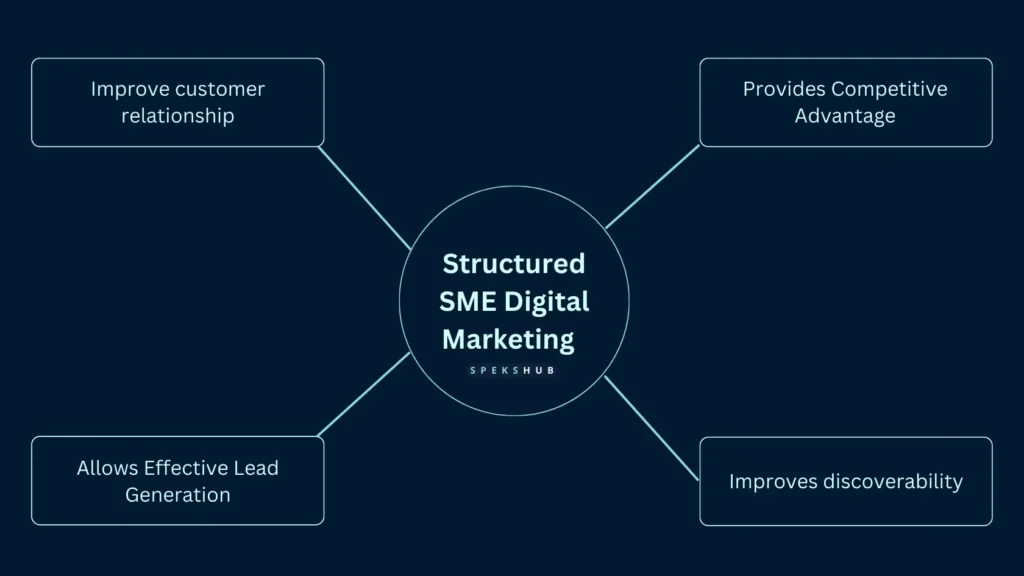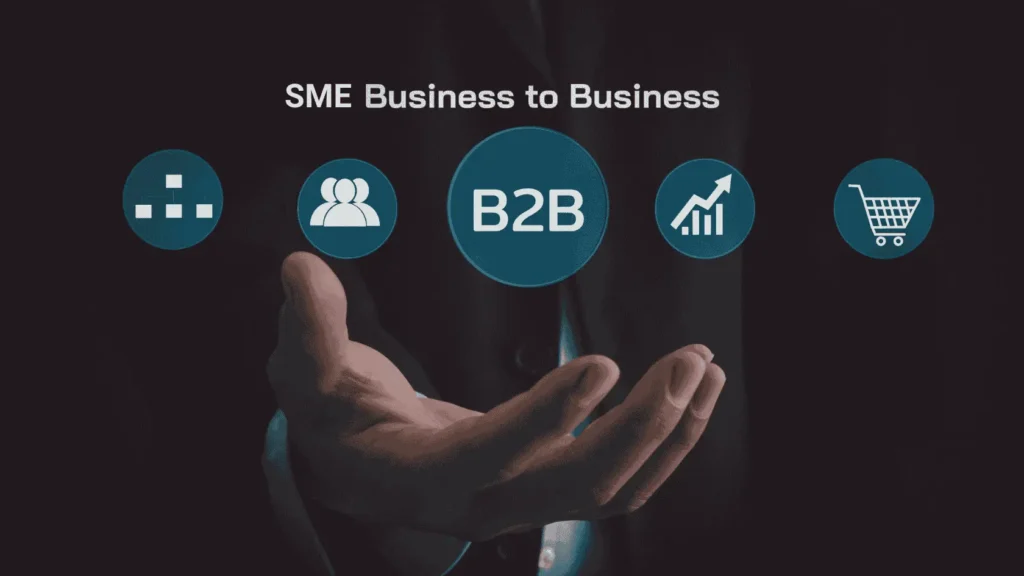Over the last few decades, digital marketing has benefitted small and medium-sized enterprises (SMEs). It has allowed the SMEs to compete with larger corporations worldwide.
It might be interesting to note that 99.05% of companies in the United Kingdom are SMEs. This shows that countless businesses are in a similar situation trying to differentiate themselves and get loyal customers in a very competitive B2B ecosystem
But don’t worry—a smart digital marketing plan can set your SME apart, boost your visibility, and build credibility. Whether your goal is to improve your search ranking, generate high-quality leads or increase your brand’s recognition, our top 7 strategies have you covered.
Key Takeaways
- Compete with Bigger Businesses: A well-designed digital marketing strategy enables SMEs to compete with larger businesses by focusing on niche marketing, personalized branding, and agility in adapting to market trends.
- Increase Visibility and Generate Leads: The use of SEO, content marketing, and social media outreach helps SMEs improve search engine rankings, increase credibility and visibility, and reach their target audience.
- Cost-Effective Marketing: It offers affordable solutions, such as social media engagement, email marketing, and targeted ads, allowing SMEs to promote their business without large budgets.
What is SME Digital Marketing?
SME digital marketing deals with online techniques and solutions that are tailored specially for small and medium sized companies. It helps SME’s establish effective and economical communication with potential customers, as well as enhance their credibility and industry presence without exceeding their budget.
Differences Between B2B and B2C SME Marketing
| Aspects | B2B (Business-to-Business) SME Marketing | B2C (Business-to-Consumer) SME Marketing |
|---|---|---|
| Target Audience | Focuses on market professionals, Business Leaders, and decision makers within the industry | Focuses on individual clients whose decisions are based on their personal needs and lifestyle benefits. |
| Way of Communication | Through facts, case studies and reviews to show how the product or services impacts the business positively in long term | Build emotional connection with consumers through strong and friendly words, also with quality imagery. |
| Sales Cycle | Includes a longer, structured buying decision process which requires thorough research and input from many stakeholders. | It normally includes shorter and more spontaneous buying process influenced by personal choices or triggers |
| Decision Factors | Decision makers focus on smart logical decisions, return on investment, efficiency, and clear long term benefits. | Decisions are normally based on feelings, convenience of the consumer and quick satisfaction. |
| Marketing Strategy | B2B online marketing uses personalized approaches like email marketing, content marketing and telemarketing to reach business leaders. | Use social media marketing and broad messaging to reach potential clients at a wider range. |
| Consumer Relationships | Focus on building long term relationships with business on the basis of reliability and expertise. | Focuses on quick sales, and making sure that consumers remember so they come back again to purchase. |
| Brand Building | Branding is concerned with defining the trustworthiness, credibility in the specific field | Branding is concerned with creating unforgettable consumer experience and establishing emotional connection. |
The challenge of B2B digital marketing for SMEs lies in building trust, generating leads, and developing relationships as opposed to simply closing a sale. The objective is to create a reputation and an identity in the industry while dealing with competition in the digital market.
How Can a Digital Marketing Strategy Drive Results for Your SME Business?
In the fast changing digital landscape, having a strong online presence is important for SME Business. It helps them to grow and to reach their potential customers. implementing a well structured Small and medium enterprises (SME) marketing allows you to to compete in the market, increase your market share and your business growth. A well designed and well structured B2B digital marketing strategies helps around 84% of businesses to build and spread brand awareness and help 80% businesses to grow sales.
Importance of a structured approach to digital marketing

Using a structured digital marketing strategy is by far the best investment an SME can make to increase visibility and scale the business profitably. This is how:
- Competitive Advantage: Digital Marketing enables SMEs to compete with large companies and get market share without investing heavily.
- Improved discoverability: Having your business online increases chances of your business discoverability. This makes it easier for you to reach your potential clients.
- Effective Lead Generation: Use of content marketing, SEO, and paid advertising helps you to attract and convert quality leads.
- Improve customer relation: Through social media and email marketing you can engage your target customers and improve your customer relationship.
Top 7 SME B2B Digital Marketing Strategies

In current digital landscape, you can compete in market and grow your business with the these top 7 B2B digital marketing strategies for SMEs:
1️ Compete with Bigger Businesses
Don’t let the size of your business prevent you from competing with the larger companies in your industry. You compete with large businesses in the market by focusing on smart niche marketing and personalized branding.
How to do it?
- Define your segment: Target a certain segment of the market instead of trying to reach out to the mass market. This approach allows you to customize marketing campaigns that resonate with your target audience.
- Flexibility: Small and medium enterprises have the ability to keep up with market developments as compared to larger firms. which enables them to implement customer- centric approaches that bigger companies might find challenging
- Narrative building: Create a marketing narrative that many people identify with.
Example: Rather than broadly stating “we sell marketing services”, you can brand yourself as “the leading marketing agency for SaaS startups”, to highlight your specialized expertise.
2️ Expand Your Audience and Increase Online Visibility
Being uneasily accessible makes you lose leads! Suitable Google algorithm optimization tactics will increase your rankings and therefore your target audience range increases as well.
Important Online marketing solutions for SMEs:
- Google My Business & Local SEO: Optimize your google my business and focus on local SEO so that your business appears in local search results.
- SEO & Content marketing: Optimize your website with SEO experts and develop quality content to boost your business ranking in search engines to target the right audience.
- Link building: Being cited on different websites increases your business credibility.
Pro Tip: Don’t forget that you need to update reviews, photos, and business information regularly on Google My Business, as it is vital for the business.
3️ Make Sure Your Potential Customers Can Find You Online
Simply having a website is not enough! The website needs to be modern, well optimized, and mobile responsive.
Website Optimization Checklist:
- Website Speed matters: A slow website can result in a drop of 53% lost mobile visitors and reduce the conversion rate to 7%.
- Mobile-Responsiveness: More than 80% of B2B buyers conduct business searches on smartphones.
- Social Media Marketing: Businesses promote their services on LinkedIn, Twitter, and even YouTube for increased B2B lead generation UK.
4️ Leverage Cost-Effective Digital Advertising
Paid advertising seems to be expensive, however, when it comes to B2B SMEs, it is utilized to target an audience in a cost-effective manner.
Affordable Suggestions for Digital Advertising:
- Google Ads & Linkedin Ads: Use these platforms to target decision makers in your specific industries.
- Retargeting Ads: Users that have accessed your website already but haven’t converted can be re-targeted with your ads.
Pro Tip: Always start small with your advertising budget and scale up according to the results metrics!
5️ Build Trust Through Content Marketing
B2B buyers are not impulsive retail shoppers, they review, compare, and analyze information in great depth before arriving at a decision. This is where content marketing becomes important to build trust and relationship:
- Blog posts: Discuss and advise about certain industries.
- Case studies: Discuss successful projects that were implemented.
- Whitepapers & guides: share insights and expertise in your industry to increase your credibility in the market.
6️ Use Email Marketing for Lead Nurturing
Email marketing has not died—it remains one of the best channels to develop prospects and convert them into loyal clients.
Email marketing best practices:
- Personalized sequences: Tailor emails based on user behavior and preferences.
- Lead magnets: Develop leads magnet through emails by giving away free eBooks, discounts, or webinars.
Marketing automation: Utilize tools to automate email marketing like Mailchimp or HubSpot to automate campaign efforts.
7️ Leverage Data and Analytics for Growth
Not monitoring your digital marketing activity means you are untracking revenue!
Helpful analytical tools for better marketing outcomes:
- Google Analytics: Analyze traffic, conversions, and bounce rates for your business website.
- CRM Tools : Record customer interactions and automate communications for better engagement with CRM tools like Salesforce.
- Use supporting tools for precision: In industries where unit accuracy matters — such as logistics, construction, or product manufacturing — tools like Scale Converter can help convert measurements accurately before feeding them into dashboards or reports.
- Adjust marketing strategies based on Data: Regularly review analytics to improve your marketing strategies and better ROI
How Can a Digital Marketing Strategy Drive Results for Your SME Business?

A digital marketing strategy can greatly improve the growth curve positively of your SME by capturing attention, generating leads, and transforming them into loyal customers.
Let’s examine the ways in which digital marketing produces these results:
Compete with bigger businesses
Most smaller enterprises feel scared by big corporations that spend large amounts of money on marketing. Well, the good thing is, not all is lost due to the availability of digital marketing, which creates a level playing field.
How to compete with bigger brands?
- Identify a unique selling proposition (USP): Focus on what makes your SME different from your competitors. Focus on your specialization and customer-first philosophy.
- Use an agile approach: Unlike bigger corporations, SMEs have the ability to swiftly change in response to new trends and market changes.
- Focus on delivering high quality: Large competitors with inflexible systems can be outdone by personalized marketing and faster service delivery.
Example: A boutique software company can market itself as “the go-to automation expert for startups,” avoiding competition with enterprise-level solutions.
Expand your audience and increase online visibility
If your potential clients cannot locate your business on the internet, they will most likely go for your rivals. The answer to expanding your target market lies in adopting several digital approaches and increasing your visibility on various platforms.
Smartest Ways to Increase Target Audience Include:
- Social Media Outreach: Establishing authority on platforms like LinkedIn, Twitter, and YouTube enables you to gain a foothold in your niche.
- Content Marketing: Producing blogs, guides, and case studies that highlight the struggles of your particular industry will capture your target audience attention.
- Search Engine Optimization (SEO): Incorporate relevant B2B keywords, meta tags, and descriptive content into your website to improve your website ranking. The description should summarize the content of the webpage and be designed with SEO and remarketing in mind.
Example: A small digital agency relies on gaining clients via LinkedIn marketing by posting insightful opinions, providing case studies and expert opinions.
Make sure your potential customers can find you online
Owning a social media account and a business website is the bare minimum, improving your online presence so clients can locate you when searching for answers in your industry is critical.
Enhancing Online Presence through:
- Google My Business (GMB): A well-catered and managed GMB profile helps to enhance your local SEO ranking if you serve as a local business.
- Website Optimization: Ensure your webpage is optimized for speed, responsive design, and user-friendly features for potential B2B customers.
- Targeted Content Strategy: Make sure to produce blogs, FAQs, and guides centered around your market niche to improve your search rankings.
Example: A SaaS startup will benefit its lead conversion rates by optimizing its website speed, as well as focusing on SEO keywords and local business listing searches.
Use a cost effective way to promote your business
One of the most difficult problems for SMEs to overcome is dealing with low advertising spending. However, digital marketing is useful because it offers solutions that are affordable and adaptable without the need for big budgets.
Cost-effective digital marketing strategies for SMEs:
- Marketing through social media: Being active on Twitter and LinkedIn is free and helps build credibility.
- Email advertising: Automated emails are a great cost effective way to nurture leads and maintain customer engagement.
- Paid Ads (Smart Bidding): Platforms like Google and LinkedIn offer targeted ad choices that let SMEs reach targeted markets without overspending.
Pro Tip: Even lesser-known businesses can use a budget of £10 a day on Google Ads, and still have the potential of being exposed to a significantly larger audience.
Conclusion
The advent of B2B digital marketing has transformed the landscape for SMEs in a very constructive manner. Even with limited resources, small businesses can implement the right strategies and compete for larger market shares, acquire more customers, and steadily increase revenue growth.
At Spekshub, we help businesses in digital marketing strategies like B2B lead generation in the UK, SEO, content marketing, social media, and even paid advertising improve the chances of ROI among SMEs. These digital marketing business-to-business techniques ensure that brands get recognized, receive quality leads, and grow without excessive spending.
By establishing a website, incorporating email marketing, and utilizing business analytics, marketing activities will be effective, quantifiable, and growth supportive, as marketing activities will be simple and straightforward to track.
FAQs
What does SME mean in marketing?
An SME is a small and medium-sized enterprise that is different from big corporations in terms of scale. In marketing, SME strategies are aimed at getting maximum results with the least use of resources to reach out to customers, create awareness, and compete with bigger firms.
Because of their budget constraints, SMEs resort to affordable yet reliable marketing avenues like SEO, social media, content marketing, and email campaigns to gain leads and grow the business.

